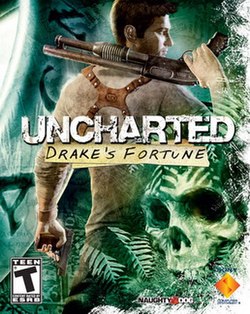Plot
Treasure hunter Nathan "Nate" Drake, accompanied by documentary filmmaker Elena Fisher, recovers the coffin of his self-proclaimed ancestor Sir Francis Drake off the coast of Panama, having located it from coordinates inscribed on a family heirloom: a ring Nate wears around his neck. [10] While the coffin doesn't hold a body, it does contains Sir Francis' diary. Soon after, pirates attack and destroy Nate's boat, but Nate's friend and mentor, Victor "Sully" Sullivan, rescues the two in his seaplane. While regrouping at a nearby village, Nate reveals to enraged Sully that the diary contains a map to El Dorado. Seeing Elena as a liability, they abandon her at the dock and begin the hunt for the golden city.
A week later, following the map into the Amazonian rain-forest, Nate and Sully discover an ancient temple that once held a large golden statue, long since plundered by Spanish Conquistadors. Nate realizes that the statue was in fact the real El Dorado and decides to continue his pursuit. [11] Nearby, they find an abandoned Nazi U-boat hanging off a waterfall, inside of which Nate finds another page from Drake's diary showing the statue was taken to an uncharted island in the South Pacific. However, mercenaries led by criminal Gabriel Roman (Simon Templeman), to whom Sully owes a substantial debt, and his lieutenant Atoq Navarro (Robin Atkin Downes), intercept Nate and Sully. They take the journal and shoot Sully in the chest, but Nate manages to escape. Devastated He quickly encounters Elena, who followed the pair through the jungle, and they decide to team up and use the diary page to find the statue first. [12]
While flying to the island, anti-aircraft fire forces Elena and Nate to bail out and they are separated. After retrieving supplies from the wrecked seaplane, Nate heads toward an old Spanish fort to find Elena. While navigating the fort, he takes note of the many wrecked ships along the island's coast and soon finds evidence of Drake's presence on the island. Nate is briefly captured by pirates led by his old associate Eddy Raja (James Sie), but Elena breaks him free and they flee to a flooded Spanish city along the island's coast. They make their way to the city's customs house and find records showing the statue was moved further inland to a monastery. Along the way, they learn that Sully somehow survived and is now seeming to work with the antagonists. [13] Nate and Elena find and rescue Sully who, having survived due to Drake's diary blocking the bullet, explains he was buying time for Nate by misleading Roman.
Searching through a mausoleum, Nate overhears an argument between Roman, Navarro, and Eddy, revealing that Roman hired Eddy to capture Nate and secure the island, with the reward being a share of El Dorado. Following Nate's escape, Roman doubts Eddy's abilities and ignores his claim that something cursed on the island is killing his men. Nate and Elena find a passage leading to a massive underground treasure vault, in which they find the body of Sir Francis, assuming that he died searching for the treasure. They encounter a terrified Eddy and a crew member, shortly before they are attacked by mutated humans who kill the crew member; despite Nate's efforts, Eddy is also killed when one drags him into a pit.
Nate and Elena escape through a nearby tunnel, which they soon find leads to an abandoned Nazi submarine base. Venturing into the base, Nate discovers that the Germans had discovered the statue but, like the Spaniards before them, became cursed and mutated as well. With all of the evidence he has found, Nate pieces together that Sir Francis, upon discovering the statue's power, attempted to keep it on the island by destroying the ships and flooding the city, before he too was killed by the mutants. [14] He also learns that the mutants have relocated the statue to their lair under the monastery's church.
Nate returns to find Elena has been captured by Roman and Navarro. Regrouping with Sully, he fails to stop them from reaching the statue. Navarro, aware of the curse, tricks Roman into opening the statue, revealing it to be a sarcophagus containing a mummy infected with an airborne mutagenic virus. When Roman himself becomes a mutant, Navarro kills him and takes control of his men. He reveals that he plans not to sell the statue itself, but rather the virus as a biological weapon. [15] Nate jumps onto the sarcophagus and rides it as it is airlifted onto a boat in the bay. He engages and defeats Navarro and manages to sink both the sarcophagus and him to the bottom of the ocean. [16] Sully arrives, and after Nate and Elena display affection towards each other, they leave the island with several chests of treasure. [17]


